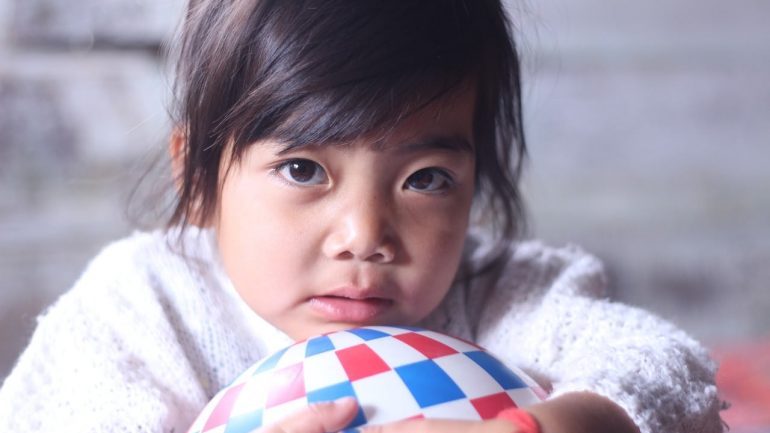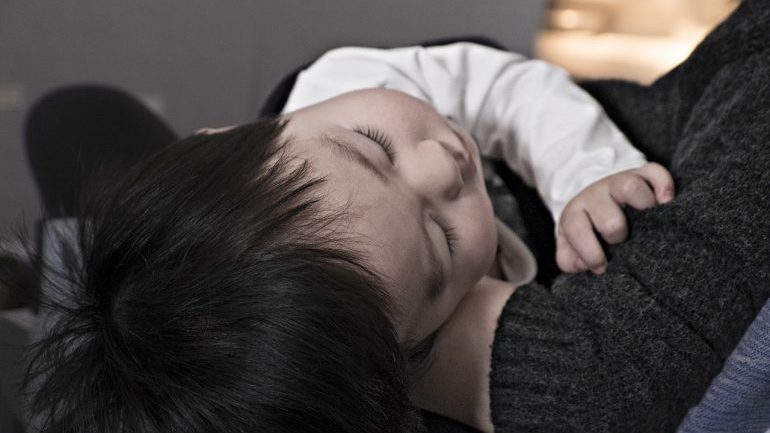Children’s Sleep: How Much Sleep Do Kids Need?
written by / October 28, 2019

Sleep, a natural biopsychosocial phenomenon, is a physical necessity. However, the amount of sleep we get is influenced by several factors: the age of the individual, their psychological state, and relevant cultural practices. Because the amount of sleep children need varies in their developmental years, parents can’t help but wonder, how much sleep do kids need?
During their first year, babies usually sleep about 14 hours a day. However, there are substantial individual differences—some babies are fine with 10 hours of sleep a day, while others need 18 hours. What’s more, as they grow and develop, the total amount of sleep children need, and when they need it, will continue to fluctuate.
Sleep is essential for brain development and early childhood learning. Parents should strive to follow the recommended sleep by age for their baby, toddler, or child—as well as for themselves. At the same time, parents should be tolerant of any temporary sleep problems that their child may have. As a rule, knowing the child’s individual needs and respecting them will make it much easier for their child to develop a healthy sleep regimen.
The Physiological and Psychological Importance of Sleep for Children
As we sleep, our bodies go through several cycles, which are broken down into stages. Throughout early childhood, the duration of one sleep cycle is about 50–90 minutes. For a newborn, the first sleep stages—during which it’s easier to wake up—last about 50% of the time. The duration of these stages will gradually decrease to 25% during adolescence. For a young child, sleep patterns that include waking up once or twice are the standard.
Whether a baby or a young child’s sleep is “normal” depends very much on the parents’ expectations and perceptions. Sleep problems are usually caused by waking up at night or by having a difficult time going to bed at night. Sleep deprivation has dramatic consequences on a child—they will often be irritated and tired throughout the day. And while it’s necessary to ask how much sleep do kids need, it’s also worth emphasizing the importance of sleep for the entire family since parents will also feel the consequences of lost sleep.
As your baby grows and becomes more aware, their sleep schedule will change. They might have certain fears that prevent them from sleeping at night. Initially, your baby will need to be cuddled and soothed. Gradually, the child can learn to fall asleep using a favorite blanket, doll, or toy until they begin to fall asleep alone. A young child’s ability to regulate their sleep patterns and fall asleep again after waking up develops as they mature.
Emotional experiences during the day can affect how well kids are sleeping at night. When they feel tense, restless, or anxious, it’s likely that a child will wake up more often at night and have trouble falling asleep. It’s also natural for there to be temporary periods of sleep problems as children gain new skills and become more independent and mature.
Cultural Practices Related to Kids and Sleep
There are different cultural practices associated with how babies and toddlers sleep—from sharing the same bed as their parents to sleeping in a separate room shortly after birth.
Cultural differences also impact the ways they fall asleep. For some cultures, it’s natural for a baby to fall asleep during normal family activities and be brought to bed. For others, the ritual of preparing for bed is an integral part of caring for the child. For example, before going to sleep, a baby may need to be fed so they can fall asleep more comfortably and deeply.
For decades in Western culture, experts have been promoting the baby’s independence since birth. It’s a sign of growing maturity when a child develops a sleep pattern and learns to control how long they sleep. Because of this, parents encourage their child to sleep for prolonged periods on their own, during which they can achieve deep sleep early.
Nevertheless, for 90% of the world’s population, parents sleeping with their child is the norm. An evolutionary perspective confirms that co-sleeping improves the baby’s survival and health. However, this practice can also pose some dangers as the baby could potentially be suffocated by a parent or their blankets.
The best safety practices regarding children and sleep require that parents who consume alcohol, tobacco, or drugs, or who have a severe health or weight problem, sleep in a separate bed. Another argument against sleeping together is that the child could form an excessive dependency on their parents, but the studies don’t confirm this.
How Many Hours of Sleep Do Kids Need?
The American Academy of Sleep Medicine (AASM) has collected accurate, verified information on how much sleep kids need. The data provides helpful guidelines on how much sleep children need at different stages in their development. The numbers refer to how many hours should be devoted to sleep over a 24-hour period.
Children 1–4 weeks old: 15–18 hours of sleep a day
According to the baby sleep patterns by age, newborn babies usually sleep between 15 and 18 hours a day in total. However, it’s too early to celebrate because their rest is short, usually lasting for one to two hours at a time. You probably won’t get enough sleep, but this period doesn’t last long.
Keep in mind that babies born prematurely tend to sleep longer, and those with colic problems wake up more often. Whatever the case, their sleep won’t follow a specific pattern because newborns don’t yet have a regulated biological clock. This means that their bodies can’t distinguish between day and night, and therefore their sleep isn’t impacted by the time of day.
Children 1–3 months: 16–18 hours
The suggested sleep requirements by age indicate that most babies sleep 16 to 18 hours a day. Most of the time, they sleep after being changed and fed. This is a time when the baby is adapting to life beyond the mother’s belly, so it’s natural for your child to wake you up very often, especially at night.
Children 3–6 months: 13+ hours
As your baby grows, their sleep decreases. However, If you wonder how much sleep do babies need at this age, the answer is no less than 13 hours a day. And usually the baby will sleep for about three hours at a time. By now, the baby should already be starting to orient itself, so he or she can see the difference between day and night. You will probably notice your baby’s sleep has begun to follow a particular sleep pattern.
Children 6–12 months: 13 hours
This is the right time to teach your baby to sleep at night. Best of all, they’re asleep for longer periods of time: if you’re lucky, you can enjoy up to six hours of rest at night while your baby sleeps—but don’t worry if that still doesn’t happen. The amount of sleep needed by age drops to 13 hours a day during the first year, meaning your child should sleep once or twice a day before the evening. This is the perfect age to start establishing a sleep routine.
If your child has trouble sleeping through the night, you can reduce the number of naps during the day: three is the optimal number for babies under six months, but as they get older, once or twice a day is more than enough.
Children 1–3 years: 12–14 hours
At this point, the AASM’s sleep chart by age shows that a child’s need to sleep reduces to about 12 hours a day, where the child sleeps for 2–3 hours in the afternoon, and the rest is during the night. Most 2-year-olds only sleep during the day for one hour, and at night they sleep for nine hours. This is the best time to establish sleep habits, and this becomes easier with each passing day as your child grows older and begins to understand more.
But exactly how much sleep does a 2-year-old need? The answer varies, but usually 10–14 hours is healthy. If possible, add two more hours to how long your child sleeps overall. At the same time, try reducing how long they sleep during the day—during this period, they should sleep just once a day. As your child gets older, they will still need to sleep during the day, but for a shorter period. The time should range from one to three hours as you gradually reduce it.
So when do babies sleep through the night? Sleep specialists state that the toddler age is when your little one has no sleep problems at night. Usually, children this age fall asleep between 7 p.m. and 9 p.m. in the evening and wake up between 6 a.m. and 8 a.m. in the morning.
Children 3–6 years: 10–12 hours
This is the period when your child will need to be phased out of daytime naps. They will still need to nap at age three, but by the time they’re five, they should be transitioning away from the toddler sleep schedule and instead sleep through the night. Just make sure your child gets enough sleep at night, and everything will be fine.
More good news, by this age, all sleep problems should no longer be an issue. And if you were lucky enough not to encounter any of them, you can rest easy because few sleep problems manifest after the age of three, according to the data following toddler sleep cycles.
Children 7–12 years: 10–11 hours
Although the average amount of sleep a child at this age receives is nine hours, in fact, your kid should sleep at least 10. This is also quite difficult because children become more active at this age.
When a child is older than 12 years old, the amount of sleep they need is different. Some teens sleep as adults (8–9 hours), while others sleep more. However, there’s no longer a rule for required hours of sleep—everything depends on the needs of the particular child.
What Specific Situations Affect How Long Children Sleep?
Underlying psychiatric or physical conditions can cause sleep loss and insomnia in children, and their total sleep hours will be seriously impacted. Among these are attention deficit-hyperactivity disorder, sleep apnea, snoring, sleepwalking, talking in their sleep, restless legs syndrome, etc.
In cases like these, you should talk to your pediatrician. They may refer your child to a sleep specialist. Fortunately, sleep deprivation in children can be alleviated with lifestyle and environmental changes surrounding bedtime.
What to Consider When Your Child Is too Sleepy
- If your child is active when they’re awake, you can safely let the kid sleep.
- Newborn babies sleep almost all the time—often throughout the day—without considering your daily regimen. But your child’s sleep needs by age will change over time.
- If your newborn is sleeping for several hours, in some cases it’s good to wake the baby for feeding, especially in case of physiological jaundice. In general, however, it’s better not to feed your baby while it’s sleeping (unless the baby is premature and should be fed more often). If your baby is eating well and eats at least 6–8 times a day, let them continue to rest, even if it seems like your child is sleeping too long compared with the AASM’s sleep chart for kids.
- If you want to communicate with your baby, but he or she turns their head and doesn’t answer with a look, smile, or movement, don’t insist. It’s better to wait until your child is eating or playing to speak to them. Keep in mind that some babies get tired quickly and often need a break for food or rest.
What to Do When Your Baby Doesn’t Sleep Enough or Doesn’t Sleep Well
- Your child and the sleep they get should be treated carefully. Your baby won’t be able to sleep peacefully if it has needs that haven’t been satisfied. Rock, swing, or feed your baby when it cries or signals that it needs something.
- Don’t worry too much about temporary problems with your little one’s sleep. Give the child as much comfort as you can in these moments and be patient.
- Get enough sleep yourself by sleeping at the same time your baby does or entrusting them to another person’s care while you sleep. This will give you the peace and patience you need while caring for your baby.
Healthy Sleep Habits to Help Kids Sleep the Hours They Need
The American Academy of Pediatrics (AAP) recommends parents follow the AASM’s guidelines. To ensure this, the AAP also provides some helpful tips about how to sleep better right from the start so that children can develop the best sleep habits.
- A daily sleep routine will help your child get to sleep wherever you may be.
- Sleep should be a priority for all family members, including parents, who have to be role models for their child.
- Solid food should be introduced only after six months. Anything earlier will cause digestion problems and a possible tummy ache for your baby, whose sleep schedule will also be interrupted.
- Create a soothing sleep environment.
- Put your child to bed with just water to drink, because anything else can cause tooth decay.
- All e-devices should be turned off at least an hour before bedtime.
- The AAP has been advocating for students to start class at 8:30 a.m. or later. If you came here asking how much sleep do kids need? keep in mind that it’s also worth asking when they need to get their sleep. At the beginning of puberty, kids’ sleep-wake cycles begin to shift up to two hours later, making the early hours difficult.
- Don’t arrange too many activities for your child (i.e., sports games, lessons, appointments) too late into the evening.
- Physical and mental activities during the day will guarantee that your kid’s sleep time will be long enough for a healthy rest.
- Recognize sleep problems early. This could include difficulty falling asleep, waking up too much, snoring, sleep apnea, nightmares, and so on.
- In some cases, a sleep specialist may prescribe melatonin. Melatonin and children’s sleep are mutually and positively related.
- Ask your child’s teacher or care provider about your child’s alertness during the day. Some sleep disorders in children may manifest as learning or behavioral problems in the daytime. In this way, you’ll have a clearer understanding of how to get better sleep for both you as a parent and your children.
FAQs
Why do kids need sleep?
Why is sleep important? Sleep is vital for babies, toddlers, preschoolers, elementary-age kids, and adolescents to support their rapid mental and physical development. Growing kids need much healthier sleep compared to adults. Interestingly, missing as little as 30 to 60 minutes of sleep time could have a significant impact on a child’s physical or mental performance. It’s also worth noting that insufficient sleep and overtiredness can look like symptoms of ADHD and other disorders.
At what age do toddlers stop napping?
Parents often ask themselves, should their child be taught to sleep once a day or should they skip naps entirely? By the age of a year and a half, a child is already awake continuously for nearly five hours at a time, so it’s possible to switch to one nap daily. The change to one nap a day is a transitional period for a child. Parents can help by trying to ease them through it.
How much sleep do toddlers need during the day? Toddlers should be the ones who determine whether they need a nap during the day or not. It’s up to the parents to choose whether to put the child to sleep in the morning or the afternoon, but it’s important not to mix this. Sudden regime changes can cause sleep disturbances and agitation. If a routine needs to change, the transition should take 1–2 months.
At what age should a child put themselves to sleep?
The behavior of the child will provide the answer. If it’s difficult for them to fall asleep, the solution is to take care of them before falling asleep after quiet and peaceful activities. Creating a regimen is essential and necessary for both the health and well-being of the child. However, the routine doesn’t need to be followed blindly.
To help them learn to fall asleep independently, it’s good for children to sleep in their own room. There’s nothing wrong with helping your child calm down and relax. You can tell them a story or read a book. But it’s best to leave the room before your child is fully asleep. Still, if your child cries, it’s good to stay in the room until they calm down.
Conclusion
So how much sleep do kids need to stay healthy? It’s been confirmed that the right amount of sleep based on a child’s age is essential for their mental and physical health. Therefore, making sure your child adheres to the right sleep routine will help you ensure a good quality of life for them. Furthermore, the benefits of sleep include improved attention, behavior, learning, memory, and emotion regulation. On the other hand, not getting enough sleep each night can be an increased health risk for diseases such as hypertension, obesity, and depression.
Table of Contents
The Physiological and Psychological Importance of Sleep for Children
Cultural Practices Related to Kids and Sleep
How Many Hours of Sleep Do Kids Need?
What Specific Situations Affect How Long Children Sleep?
Healthy Sleep Habits to Help Kids Sleep the Hours They Need
FAQs
Conclusion











Warning: Undefined array key "format" in /home/602518.cloudwaysapps.com/cspedpjass/public_html/wp-content/themes/disturbmenot/template-parts/post-item/post-comment.php on line 23
Warning: Undefined variable $commenter in /home/602518.cloudwaysapps.com/cspedpjass/public_html/wp-content/themes/disturbmenot/template-parts/post-item/post-comment.php on line 27
Warning: Trying to access array offset on value of type null in /home/602518.cloudwaysapps.com/cspedpjass/public_html/wp-content/themes/disturbmenot/template-parts/post-item/post-comment.php on line 27
Warning: Undefined variable $commenter in /home/602518.cloudwaysapps.com/cspedpjass/public_html/wp-content/themes/disturbmenot/template-parts/post-item/post-comment.php on line 29
Warning: Trying to access array offset on value of type null in /home/602518.cloudwaysapps.com/cspedpjass/public_html/wp-content/themes/disturbmenot/template-parts/post-item/post-comment.php on line 29